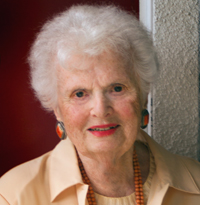By Natasha Josefowitz, ACSW, Ph.D.

LA JOLLA, California — A few nights ago, I was having dinner with Marianne, a close friend. We were reminiscing about our European childhoods and the surprising similarities in our upbringing. Marianne was born in Germany in 1922. I was born four years later in France. We were eating root vegetables together, a combination of carrots and turnips, which was a staple in both of our childhood kitchens. We ate calves’ brains with black butter, unknown to our American friends. Neither one of us had ever seen a marshmallow before coming to America. We never ate corn on the cobb because corn was only food for pigs. We also had never heard of peanut butter. Both of our mothers would remedy any stomach ailment with grated apples. Our fathers always came home for lunch and took a nap before going back to work. Children also came home from school to eat lunch, which was the main meal of the day. We called this afternoon meal “dinner.” The evening meal was called “souper.” This consisted of soup with bread and cheese, and some fruit. We also had tea at 4 o’clock with a chocolate croissant. Breakfast consisted of a “petit pain” (a soft roll) with jam.
We both remembered the toilets with a large container of water beneath the ceiling and a chain one had to pull to get the water to run into the toilet bowl. I was very proud when I grew tall enough to stand on my toes and reach the chain by myself; I must have been three or four years old.
Clothes were washed in a large tub and then rung out through two wooden rolls with a hand-turned ringer, and then hung out on the balcony to dry. Paris street balconies were strung with clothes flapping in the wind. We had a bath once a week and our hair was washed once a month. Both of our mothers collected rainwater to rinse our hair to make it soft. My mother used lemon juice to make my red hair shine. There was no such thing as a shower. We used a bidet to wash before going to bed.
We had chamber pots by our beds to use at night. All the hotels in France had chamber pots in bedrooms with maybe a bathroom down a hall. Every winter we stayed at a ski resort in the mountains of Switzerland. I had wooden skis with lace up leather boots. In the summer we vacationed on the beaches of Brittany.
My toys consisted of a doll and a small miniature car. I also had a tricycle and roller-skates. My brother had a little car he could sit in and pedal around. We enjoyed reading books; my favorite was Babar, The Elephant. My parents spoke only Russian at home; I also had a Russian wet nurse who was Russian Orthodox. Every Sunday I went to church with her; I still love icons. My next governess was a German fraulein who spoke only German, followed by a French mademoiselle who spoke only French. By the time I was six, I was fluent in three languages; my parents considered me to be educated.
Although we were Jewish, my mother sent me to the nearest school, which happened to be a Catholic elementary school run by nuns; I was the only Jewish girl. I had never been to a synagogue until we moved to America, when I attended a friend’s Bar Mitzvah. For Christmas I got a bag of oranges from Palestine and a stick to beat me with when I needed to be punished. My German friend also remembers getting oranges and a stick for Christmas.
My mother was a refugee from the communists; she was 13 when she and her family escaped from Moscow to Finland and then on to Berlin. I was also 13 years old when my mother, father and six year-old brother fled from the Nazis. We escaped from Paris on the last ship out of Genoa en route to Ellis Island and America. We were refugees; none of us spoke English. These were difficult times. We were lucky to be living in southern California when Paris fell. In 1940, my family bought a home in Beverly Hills, where they remained until they passed away. We loved California, and were forever grateful to have become American citizens!
All of this may seem strange to my readers. Ask your parents and grandparents whether these stories resonate with their own childhood memories. You will then have tales to tell your children about their long-ago ancestors.
*
© Natasha Josefowitz. This article appeared initially in the La Jolla Village News. You may comment to natasha.josefowitz@sdjewishworld.com